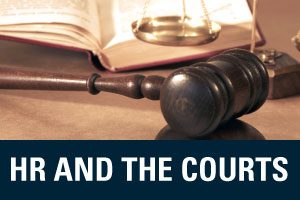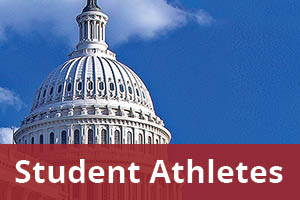by CUPA-HR | January 18, 2023
Each month, CUPA-HR General Counsel Ira Shepard provides an overview of several labor and employment law cases and regulatory actions with implications for the higher ed workplace. Here’s the latest from Ira.
Divided Court of Appeals Rules That Separating Bathrooms By Biological Sex Does Not Violate the Constitution or Title IX — Transgender Student’s Discrimination Claim Denied
The full 11th U.S. Circuit Court of Appeals (covering Florida, Alabama and Georgia) recently held in a sharply divided 7 to 4 decision that separating school bathrooms by biological sex is constitutional and does not violate Title IX. The majority decision is subject to multiple dissents (Adams v. School Board of St. Johns County, Florida (11th Cir. No. 18-13592, 12/30/22)). The case involved a St. Johns County, Florida, school board, which restricted bathroom use by biological sex, not allowing students who identified with a sex different from their biological sex to use the bathroom of their choice.
The majority decision rejected the transgender plaintiff’s reliance on the Supreme Court decision in Bostock v. Clayton County, which held that under federal job discrimination law, sex discrimination includes bias based on gender identity or sexual orientation. The majority decision pointed out that a school setting “is not the workplace,” and Bostock expressly decided not to tackle the issue of sex-segregated locker rooms or bathrooms. The majority concluded that the U.S. has a long history of separating sexes when it comes to the use of public bathrooms, and such sex-based classifications have never necessarily violated the Equal Protection Clause. It is likely that other circuits may decide this issue differently, setting up an ultimate decision on this issue by the Supreme Court.
NLRB Expands Damage Remedies Against Employers Who Commit Unfair Labor Practices
The National Labor Relations Board (NLRB), in a decision applicable to all private colleges and universities in America, recently ruled that it will award damages in addition to back pay and reinstatement to employees who are subject to unfair labor practices (Thryv Inc. (N.L.R.B. Case No. 20-CA-250250, 12/13/22)). The case was brought by the NLRB against Thryv Inc., a software and marketing company, which the NLRB alleged violated the National Labor Relations Act (NLRA) by laying off employees without first bargaining with the union.
The NLRB ruled 3 to 2 (with two Republican member dissenters) that its “make-whole” remedies for employees affected by unfair labor practices will include damages that are the “direct and foreseeable pecuniary harm” resulting from an employer’s unfair labor practice, in addition to back pay and reinstatement. For example, this would include out of pocket costs for medical payments that would have been covered by an employer’s health insurance had the employee continued to be employed but for the unlawful termination.
Firefighter Loses First Amendment Religious Objection to Being Photographed for ID and Accountability Card
A Christian firefighter from Bourne, Massachusetts, lost his First Amendment religious claim against his fire department after he was disciplined (suspended for 24 hours and ineligible for pay increases for at least six months) for refusing to be photographed for his ID card and accountability tag that would be attached to his firefighting gear and used at fire scenes (Swartz v. Sylvester (2022 BL 416412, 1st Cir., No. 2101568, 11/21/22)). The firefighter claimed that his religious beliefs precluded him from engaging in acts of self-promotion and that the photos might be used for promotional purposes.
The fire chief’s directive came after he became aware that some firefighters had worn ties and others wore t-shirts for their ID and authentication tag photos. The fire chief issued a directive that all firefighters would sit for their photos wearing their dress uniform for consistency. The photos would also be used in a display at the firehouse, be submitted to the media when a firefighter died in the line of duty and might be submitted to the media following a firefighter’s promotion.
In rejecting the plaintiff’s claim, the court concluded that the directive was applied uniformly, without exception, was facially neutral and was rationally related to the legitimate government purpose of publicizing the fire department and promoting the integrity of governmental institutions.
NLRB General Counsel Concludes That the NCAA Violated the NLRA By Failing to Treat Student-Athlete Basketball and Football Players as Employees
The NLRB general counsel has concluded that the NCAA is violating the NLRA by failing to treat student-athlete basketball and football players as employees. The decision could eventually lead to the ability of these student-athletes to form labor unions. Absent settlement of the case, the NLRB Los Angeles Regional Office will issue a complaint against the NCAA and likely the Pac-12 Conference and the University of Southern California for failure to treat these student-athletes as employees. The case was brought to the NLRB by the National College Players Association, an advocacy group seeking to organize student-athletes. The final decision as to whether student-athletes are employees rests with the full NLRB, which will eventually address this matter.
New York Temporarily Abandons Statute of Limitations on State Law Sex Harassment Claims
New York state has temporally done away with the statute of limitations on sex abuse claims, giving adult victims of sex abuse one year to file a claim against employers and offenders seeking financial compensation. The Adult Survivors Act, which became effective November 24, 2022, gives victims of alleged sex abuse a one year period to file a claim in New York no matter when the alleged abuse occurred. The new statute is intended to fill the gap left by 2019 legislation, which expanded New York’s statute of limitations on sex abuse cases from one year to 20 years, but did not do so retroactively.
Jury Awards Former Softball Coach $800,000 in Damages for Emotional Pain and Mental Anguish in Sex Discrimination Case
A federal court jury has awarded a former university baseball coach $800,000 in damages for alleged emotional pain and mental anguish in a sex discrimination case in which the former coach alleged she was paid less than male comparators and was suspended from her position because of her sex. She had been suspended from her position following parental complaints about her coaching style. She alleged that a male coach who was the subject of similar parental complaints was treated less severely. The court dismissed her complaint with regard to salary discrimination, but allowed her discriminatory suspension allegations to proceed to a jury trial. The $800,000 jury award is subject to the university’s Motion for Judgment, not on the verdict likely to be filed after a final award is formalized by the federal district court judge (Hall v. Alabama State University (M.D. Ala. No. 16-cv-00593, 12/19/22)).
The jury trial proceeded for two days, and the jury concluded that the plaintiff’s gender was a motivating factor in the decision to suspend her.
Boston College Trustees Sued in Class-Action Lawsuit Claiming ERISA Violations in Allegedly Allowing “Above Market” Administrative Fees to Be Paid to Investment Adviser Without Competitive Bidding
A federal district court judge recently denied the motion for summary judgement filed by defendants and allowed a class-action lawsuit to proceed against the trustees at Boston College who were sued for allegedly allowing “above market” record-keeping fees and “excessive” investment-management fees, which plaintiff’s claimed were not properly monitored or assessed through a competitive bidding process. In ruling the motion a “close call,” the judge allowed the lawsuit to proceed to discovery into the institution’s and trustees’ conduct (Sellers v. Trustees of Boston College (2022 BL 461759, D. Mass. No. 1:22-cv-10912, 12/27/22)).
The plaintiffs also challenged the alleged inadequate performance of certain plan investments. The retirement plans in question cover approximately 3,000 employees and contain over $1.1 billion in assets. In allowing the case to proceed, the judge concluded that the plaintiffs are alleging more than poor performance during a limited time. The plaintiffs are alleging that the institution and trustees were not aware of the historical imprudence of certain investments or recent published court decisions regarding questionable fees and investments in this area.



